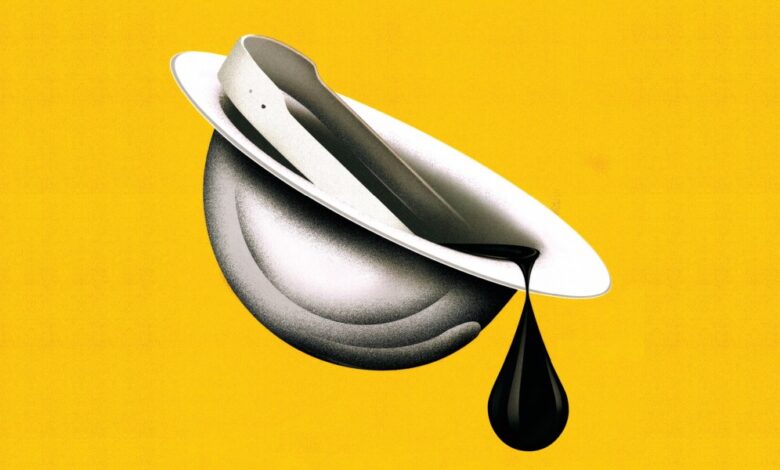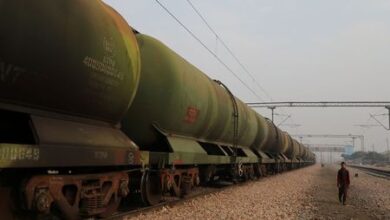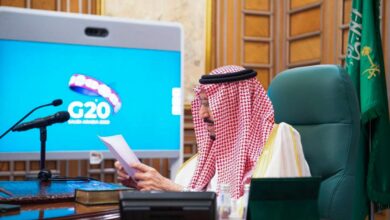Missiles, bullying claims, a tragic death: what’s going on at Saudi Aramco?

When Alwyn Whitcher took a job with Saudi Aramco in 2017, he believed he was joining a company with a history of valuing the expatriate engineers who helped build and run the desert kingdom’s state oil giant. Three years after the South African started work at the Saudi Arabian cash cow, his dead body was tipped from the digger of a JCB into a rudimentary grave at a site that looks like a landfill.
Following his death in July and his burial on the outskirts of the Jizan refinery project in the south-west of the country, his grieving family had to wait almost five months to receive any benefits or back wages from the company, which vies with Apple to be the world’s most valuable.
Kareen Whitcher, his widow, says Saudi Aramco and local authorities repeatedly denied her 46-year-old husband medical testing and treatment when he first fell ill with Covid-19 in early June, despite some of his Saudi Arabian office colleagues having tested positive for the virus.
“If they had treated him properly early on, or sent him to a proper hospital, I’m convinced he would have survived,” says Kareen, who used to run a medical centre in Durban. “But it was all too late.” Saudi Aramco says it provided Whitcher with swift medical care and acted with “compassion at all times”.
The Whitchers’ story is one among many from expatriate employees who say they have been mistreated by the world’s largest energy company, which produces roughly 10 per cent of the oil consumed globally and underpins the wealth of Saudi Arabia’s royal family.
Alwyn Whitcher, seen here with his two children in 2019, was working for Saudi Aramco when he caught Covid-19 © Courtesy the Whitcher family
Whitcher in hospital on the day he was put into a coma. He passed away in July © Courtesy the Whitcher family
For decades, Aramco has attracted expatriates prepared to accept the restrictions of life in the kingdom with promises of safe compounds for families, high salaries and bonuses. The company has long painted itself as an operation run along the lines of western energy majors such as ExxonMobil and BP, despite being a state-backed enterprise.
But five whistleblowers who spoke to the FT — including current and former Saudi Aramco employees — warn that treatment of expatriate staff has deteriorated markedly in recent years, threatening morale and the safety of projects.
These whistleblowers believe a company squeezed by an oil crash that has upended the entire industry — and under pressure to accelerate Crown Prince Mohammed bin Salman’s plans for the “Saudisation” of the kingdom’s workforce — has taken to pushing out key staff and cutting corners on projects such as the Jizan development. But they also paint a detailed picture of a company culture troubled by perceived mistreatment of experienced expatriates, from bullying and mismanagement to racism and allegations of neglect.
The complaints largely centre on Jizan, a refinery due to open next year on the country’s southern Red Sea coast and near the border with Yemen, where Saudi Arabia has waged a five-year war. Many of the problems here, including a missile strike in July by Iranian-backed Houthi militias in Yemen, are alleged to have been largely downplayed in the rush to finish the project. One current employee describes the site as a “ticking bomb”.
As the pandemic caused oil prices to tumble this year, the kingdom instructed Saudi Aramco to slash production in an effort to shore up the price and rescue its finances. Hundreds of expatriate workers have been laid off in recent months as the company scrambles to cut costs during the oil slump, following a policy of letting foreign workers go first, regardless of performance. Overtime pay and holiday leave have been restricted, with workers under pressure to do more for less because of a $45-a-barrel oil price, which is just over half of what Saudi Arabia needs to balance its budget.
Saudi Aramco rejects the allegations and “what they insinuate about the way Aramco is managed and run”, saying it is proud of its multinational workforce and safety standards that “are in excess of international standards”, with lower recorded fatality and injury rates in 2018 and 2019 than western rivals. It has indicated it will “investigate claims of any violations of our standards”.
For Alwyn Whitcher it is already too late. When he was eventually hospitalised he was quarantined for more than a week in a room which, he told Kareen, had restricted access to a toilet, resulting in him soiling himself on occasion. His only contact with the outside world was increasingly desperate video calls to his wife as his breathing became more laboured. Eventually, he was placed in a coma and intubated. Kareen became entirely reliant on Saudi Aramco for news of his condition.
The company says its HR team was in contact with his wife “twice a day, mainly by text message”, when her husband was on a ventilator. Kareen, who is adamant Aramco needs to answer for her husband’s death and her family’s subsequent treatment, says there was “no contact with me, none whatsoever, before Alwyn went into a coma”. After that, she says, communication was sparse, normally consisting of a promise to update her in the evening, followed by a later text saying something along the lines of “Still in coma, not breathing on own”. The hospital would not speak to Kareen or other family members directly.
After two weeks on a ventilator, Whitcher passed away. His wife found out through a condolence text from one of his former colleagues. She says Saudi Aramco did not formally contact her until approximately 14 hours after his death. The company believes it was the first to contact her after receiving “proper confirmation” from the hospital.
It also says Whitcher only presented with illness three weeks before his death. But Kareen says this timeline ignores a near three-week period beforehand in which he was asking the company and local authorities for help, having developed a host of flu-like symptoms after being in contact with a Saudi Arabian colleague confirmed to have the virus. “He was told just to keep his gloves and mask on,” Kareen says. “He eventually had to call the ambulance himself.”
Since her husband’s death, Kareen says Saudi Aramco has made her jump through endless bureaucratic hoops. Requests to have her husband’s body flown back to South Africa were rebuffed so many times she eventually consented to have it buried in the kingdom.
The company says the pandemic made repatriation impossible, but emails from the South African consulate in Jeddah show staff there had located a company willing to transport his body and connected them to Aramco. “It is now up to them to negotiate as to whether they will proceed with the process or not,” an email from an administrator at the consulate shows.
Saudi Aramco CEO Amin Nasser. The company says it believes it is ‘recognised as being among the best companies in the world with regard to quality management’ © Karim Sahib/AFP via Getty Images
Kareen says she was later told by a member of Saudi Aramco HR that her attempts had always been futile. “They told me, ‘It’s a good thing you decided to have him buried there, as we were never going to give you his body anyway,’” she claims.
Whitcher had worked in Saudi Arabia earlier in his 20-year career in the energy industry. He had previously been a contractor on a refinery project in the kingdom. “When he worked in Saudi Arabia before, he was paid amazingly, he was treated well, that’s why he went back,” says Kareen. “But everything had changed.”
For decades, a job at Saudi Aramco meant a golden ticket for expatriate oil workers. International employees still make up more than 10 per cent of its workforce. In 2019 the company listed a small slice of its shares on Saudi Arabia’s domestic exchange, valuing the total business at as much as $2tn, and it has long-running ambitions to list internationally.
While share prices of other large oil companies such as ExxonMobil have declined by about 40 per cent since the start of this year, Saudi Aramco’s is higher than it was in January. It is borrowing heavily on international debt markets to keep paying its bumper $75bn dividend, the vast majority of which goes to its largest shareholder, the Saudi government.
While Saudi Aramco is well regarded in the industry, it is far from an ordinary company. Its biggest shareholder is ultimately the royal family, putting its future and culture at the whim of the crown prince and de facto heir widely known as MBS. When Aramco was preparing to list, the Financial Times reported that wealthy families with ties to the kingdom, including those held and in some instances allegedly tortured in the Ritz-Carlton “anti-corruption” crackdown of 2017-18, were being pressured to invest to help reach MBS’s lofty valuation of the company.
Though MBS’s international reputation has been tarnished by the murder of Washington Post contributor Jamal Khashoggi by Saudi agents, his plans to modernise the kingdom, such as allowing women to drive and trying to increase employment for young Saudis, have won broad support at home, where under-35s make up around 70 per cent of the population. Youth unemployment was above 30 per cent last year. In 2016 MBS told The Economist that there were “10 million jobs that are being occupied by non-Saudi employees [in the kingdom] that I can resort to at any time of my choosing”. As part of his “Saudisation” of the economy, experienced expatriate workers have been squeezed — a move exacerbated by the oil crash.
They complain that the attitude towards them has corroded, with their expertise often dismissed by a new generation of Saudi Arabian management less willing to take on board international standards.
“There’s a different attitude towards expats from the days when they were highly valued and seen as having built the company,” says Valérie Marcel, an expert in state-backed oil companies at Chatham House. “There have long been concerns, even within the company, whether this generation of managers, who unlike their forebears grew up wealthy and didn’t have to struggle, would be as well placed to manage what is one of the world’s most important companies. One of Saudi Aramco’s weaknesses is it doesn’t have a culture of challenge.”
Reports from Jizan illustrate the problem, despite Saudi Aramco stating on its website that “safety is one of our five core values” and “underlies and sustains the performance of our entire workforce”. Whistleblowers say the project, which started in 2012, has become affected by problems such as subsidence of foundations, while many safety features they would expect to see on a modern refinery have been signed off without sufficient checks or testing in their view.
In a 14-page letter sent to Saudi Aramco chief executive Amin Nasser in June, one former employee laid out his concerns. He detailed complaints over his own dismissal, reports of bullying and harassment of staff, and the company’s failure to pressure-test valves and mains units and other parts of the project that had been installed “highly dangerously”. The letter details cracks in the refinery structure and subsidence of roads and foundations and describes decisions carried out “against all the advice offered from expat operations supervisors”.
One current expatriate employee, who also wishes not to be named, is blunter. “The way it is going, this refinery runs a real risk of becoming Saudi Arabia’s Piper Alpha,” he says, referring to the 1988 disaster that killed 167 workers on a North Sea oil rig. “There’s been a multitude of sins. People have been pressured to sign off work without the proper systems checks. Corners have been cut. It’s got inherent issues that have been covered up or patched over that pose a real safety risk.”
This experienced engineer says Aramco’s own engineering practices “aren’t bad as such, if they’re followed, even if they’re not that modern . . . But the problem is the ineptitude and laziness of the people that work here. They don’t like criticism, they don’t like challenge, they don’t like being told their views are wrong.”
In the letter to Nasser, the former employee said there was “an atmosphere of intimidation and constant fear” among employees at the Jizan project because of threats of “losing their jobs” if they spoke out. He had been criticised for being difficult to work with, which he believes stemmed from his willingness to challenge procedures he thought were unsafe.
“I truly never believed that coming to Saudi Arabia to work for the world’s biggest oil & gas producer to help them construct a refinery the magnitude of Jizan could end so badly for myself simply because I stood up for what I believed was right,” the letter said.
Saudi Aramco says it believes it is “recognised as being among the best companies in the world with regard to quality management across its many mega and giga projects”, arguing that “the company’s processes are carefully applied across every project . . . and the projects at Jazan [an alternative spelling] are no exception”. The company says allegations around bullying and mistreatment of staff were taken “very seriously”.
Industry analysts believe there are further challenges ahead for the company as Saudi Arabia’s priorities evolve. “MBS envisions an economy that has moved beyond oil . . . but while Saudi Aramco remains the beating heart of the Saudi economy, the strategic focus has moved elsewhere,” says Bill Farren-Price, an industry analyst at Enverus. “Maintaining the highest corporate standards that burnished Aramco’s reputation in its heyday may be less of a priority in the years ahead.”
A softly spoken English engineer with more than 30 years’ experience in the oil and gas industry, Michael Reading says he was forced to quit Saudi Aramco to protect his health. In August 2019, after three successful years at the company, Reading (not his real name) was travelling to Jizan airport to fly back to his family in the eastern city of Dhahran for a weekend break.
Earlier in his posting, Reading had become concerned about safety procedures, believing that the Saudi Arabian nationals in charge of the project were at times failing to follow best practices in their rush to sign off each stage of the development, which was well over schedule and budget. The company had said in 2012 that the 400,000-barrel-a-day refinery and petrochemical facility would be ready by 2016.
But that night when he arrived at the airport he was confronted with a more immediate risk. As he pulled up, he saw four low-flying missiles approaching from the south, flames dripping from their tails, appearing to head directly for his location. “I couldn’t believe what I was seeing, but the terror just grips you,” he says.
In a matter of seconds the missiles were overhead, when suddenly they exploded — intercepted, Reading believes, by Saudi Arabia’s air defences. Badly traumatised, he was sedated by company doctors. Later, he collapsed once more and was diagnosed with early-stage post-traumatic stress disorder by a western doctor at the Johns Hopkins Aramco Healthcare medical centre in Dhahran.
“The doctor warned that if I went back to Jizan ‘You will get PTSD — you’ll find it hard to recover from that,’” Reading says. Yet his bosses had little sympathy. He was ordered to return or risk being fired despite a doctor’s email advising: “Do not attend work at Jazan but advise them of your readiness to work anywhere else.”
Reading believes part of the problem was that Jizan had gained a reputation for people trying to get relocated. The same doctor told him that some of his work was taken up by Saudi Arabian nationals wanting to be signed off from the project, which sits in one of the poorest corners of the country.
Reading decided he had little choice but to hand in his notice. However, his letter of resignation was met with a mixture of derision and obfuscation. “My superintendent was laughing about it, reading out the letter to my colleagues in the office,” he says. “Then they started blocking my attempts to leave, saying they couldn’t pass such a letter to HR.” He believes he was forced to soften its contents to avoid his immediate management team facing questions from Saudi Aramco headquarters. But his mind was made up. “After the missile attack you look with fresh eyes and realise we’re on the verge of a war zone, but there’s little provision in place for workers’ safety. I asked, ‘What provisions are you making for our safety?’ and they’d rub their hands together and say, ‘God willing, it will be fine.’”
Other former and current expatriate employees at Jizan say their worries about the risk of attack have been ignored. “Any concerns raised about security were met with, ‘Are you questioning the ability of Saudi military authorities?’ — as if it’s an insult to even ask,” says one of the former employees, who quit after just five months. He said there was “no training or clear protocol of what to do in the event of an attack. They could have chucked a dozen missiles on that camp and folk would have been going around like headless chickens wondering where the fire hose was.”
Saudi Aramco says it has run drills and has protocols of what to do in the event of an attack. But some staff believe the risks have been downplayed. In July a missile from Yemen scored a direct hit on the refinery. Photographs seen by the FT include shrapnel hits on some of the structures. “It happened at night and was cleared up by sunrise,” says one current employee, who described a “teardrop-shaped” crater in the ground which he believes is consistent with a large projectile hitting the refinery site.
A former Saudi Aramco employee: ‘Any concerns raised about security were met with, “Are you questioning the ability of Saudi military authorities?” — as if it’s an insult to even ask’ © Sophie Gerrard
He believes the Houthis were warning they could hit personnel if they wanted. “But there’s been no communication to the workers here about the risk, beyond one laughable reference in an internal email to an ‘unfortunate external event’. In a few months there will be hydrocarbons flowing through this plant and it will be a live target that’s riddled with risks given the corners that have been cut.”
Last month in another attempted attack, two speedboats, laden with explosives and remotely controlled, were launched at an oil-loading facility close to the refinery. They were successfully intercepted by Saudi Arabian forces and the kingdom acknowledged the attack had caused a fire affecting a “floating hose” at an offshore oil-unloading platform, without providing further details.
There’s a different attitude towards expats from the days when they were highly valued and seen as having built the company
According to the corporate intelligence arm of Ambrey — the world’s largest provider of maritime security guards — satellite imagery suggests an oil tanker was berthed close to where it assesses the attack took place, indicating a far larger disaster may have been only narrowly avoided. One employee at Jizan says the refinery has recently started taking in shipments of crude oil, propane and butane as part of preparations for its start-up next year.
Saudi Aramco says it was in “constant co-ordination with the Government, including military defence forces, to ensure the protection of Jazan Economic City from attack by air, land and sea” and that “thus far, the Saudi military has managed to intercept many Houthi rocket attacks”.
Reading eventually returned to the UK, where he has taken a job with a power plant. But he says his anger recently boiled over when watching Formula One, of which Saudi Aramco has become a major sponsor this year. “You see them there portraying themselves as a normal international company,” he says. “But I wish I could tell Amin Nasser [Saudi Aramco’s chief executive]: ‘You’ve got the best company in the world at your disposal. But you don’t put what you preach into practice. You do not have the respect for human life and wellbeing that you say you do.’”
For some at Jizan, safety concerns go beyond the site’s proximity to Yemen. When the coronavirus pandemic hit earlier this year, employees say there were initially few measures taken to protect them. The buses that drive workers from the temporary camps and shared dorms to the plant were as packed as ever. Dining initially still took place in mess halls, where the quality of the food and general hygiene had long been a bone of contention among expatriates. Photographs seen by the FT show broken air conditioners dripping water down mouldy walls.
Whistleblowers say there was no screening of workers arriving at the site after trips to their families in other parts of Saudi Arabia, making it a prime vector for infection. More than 30 security personnel at Jizan fell ill in March, according to one former employee. A current employee says that by July they did have an internal contact-tracing system in place, but by that point staff were receiving five or six emails a day detailing colleagues who had fallen ill: “They were overwhelmed by it. You couldn’t get a test unless you were at death’s door.”
The Saudi Aramco Al-Midra tower complex in the eastern city of Dhahran © Bloomberg
Saudi Aramco says that both nationally and at Jizan it implemented a set of “strict guidelines” and procedures “to protect employees”, including sample testing early in the pandemic, compulsory mask use, temperature checks and other measures such as a “secure quarantine section within the camp”, with ample medical care available. “All these immediate actions and strict compliance have resulted in dramatically reducing the impact of Covid-19 on the Company’s employees and its operational sustainability,” it says.
While the vast majority who fell ill recovered, morale at the camp plummeted, according to current and former employees. Within Saudi Aramco, some expatriate workers were at more risk than others. Engineers from Europe or North America, or countries such as South Africa, were generally provided with better accommodation but those joining as labourers from countries like Bangladesh and Nepal were often in shared accommodation. Some of these dormitories were run on a “hot bed” basis, where workers would share beds with those on opposite shifts.
It is not the first time safety concerns have been flagged about Saudi Aramco accommodation. In 2015, at least 10 people died in a fire at an apartment complex housing employees in the east of the kingdom, many of whom were Pakistani.
Amnesty International has criticised Saudi Arabia, though not Saudi Aramco directly, for its treatment of migrants in the Jizan region during the pandemic, saying “thousands of Ethiopians expelled by neighbouring Yemen in March [were] left to languish in disease-ridden Saudi cells”.
“What you see in the labourers’ camps is better than that, but only marginally,” says one current Saudi Aramco employee. Early in the pandemic the company was forced to apologise after a photograph circulated on social media showing an international employee, who appeared to be of South Asian descent, dressed up as a human hand-sanitiser pump at one of the company’s offices.
An image that appeared on Twitter earlier this year of a Saudi Aramco employee dressed as a hand-sanitiser pump © Twitter
Marcel, at Chatham House, says opportunities vary in the company: “As is common in the Gulf, there’s a hierarchy related to your race and nationality, with Americans and Europeans seen as above non-Gulf Arabs and even more so above South Asian nationals who’ve actually manned operations for years.”
Kareen Whitcher says she believes such racial disparities have contributed to her treatment by the company after the death of her husband, who, like her, was of mixed race. “When someone dies in South Africa the company would send a representative to help the family, they would offer counselling. Aramco did nothing of this,” Kareen says. “They’ve left me to go into debt. I had to live on a credit card with my kids, as they refused to pay anything for five months. Memorials, kids’ school fees, I had to pay all that.”
She eventually received more than $400,000 in benefits, back pay and a company-backed insurance policy in November and December, with the latter being paid after Saudi Aramco had received questions from the FT. While Kareen says there is still a dispute over the final insurance amount, there has been a “notable shift in tone” from the company. “They were giving me no help at all, putting obstacles every step of the way,” says Kareen, who initially would only talk to the FT by video call so she could confirm it was not a sting operation by the company. “In the last week they have suddenly got busy.”
She is still angry with Saudi Aramco and how she alleges her husband and family have been treated. When the company finally returned some of his belongings, four months after he died, many of his clothes were missing, including the collection of Liverpool FC shirts that she had hoped their young son could inherit. “Alwyn got on well with his Saudi Arabian colleagues,” she says. “But the people higher up the chain have done nothing to help us.”
Alwyn’s burial in July at a site on the outskirts of the Jizan refinery project © Courtesy the Whitcher family
She says Whitcher’s mobile phone, which was returned, had been wiped of all photos, videos and messages from June 23 onwards — the day he was admitted to hospital. When told that Saudi Aramco’s response to the allegations is that it has “acted with compassion at all times”, she laughs hollowly. The company says it rejects any insinuation that it deleted anything from his phone at any stage.
She has been told by lawyers in South Africa that the chance of taking successful legal action against Saudi Aramco is nonexistent. Other expatriates, who have pursued similar avenues, including attempting to hire lawyers in the kingdom, have run into the same problem. “You can’t fight these people. You would be fighting the Saudi Arabian government, which is the royal family,” Kareen says. “So it doesn’t matter what you say.”
A 12-second video clip of the end of Whitcher’s burial, filmed by Kareen’s nephew, who also works at Jizan, shows a sandy site covered in track marks. Current employees say it was set aside for non-Muslims who had died of Covid-19. Kareen worries the family may not be able to locate the grave in the future, though the company says the burial plot co-ordinates have been recorded by the cemetery. “They have never shared them with me or anyone in the family,” she says.
“We thank you for our brothers in Saudi Arabia and Saudi Aramco for the support that they have given us, amen,” says one man in the clip. “It is like a sick joke,” says Kareen. “They have given us no support at all.”





